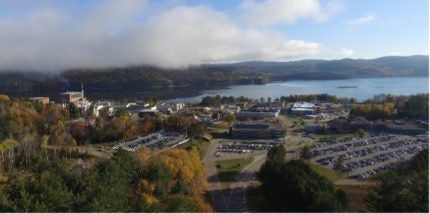
Canadian Nuclear Laboratories (CNL) has launched the New Nuclear & Emerging Technologies (N2ET) programme to help fast-track deployment of promising research and technologies. The programme seeks to facilitate collaboration between CNL and other pioneering technology developers, and to position CNL to direct funding into promising technologies or ventures that align with its mandate.
N2ET initially consolidates several existing clean energy and health sciences projects into one programme. These include CNL’s small modular reactor (SMR) siting invitation; the Canadian Nuclear Research Initiative (CNRI); CNL’s Clean Energy Demonstration, Innovation & Research (CEDIR) Park project; joint venture company, Actineer, recently launched by CNL and ITM Isotope Technologies Munich (ITM) of Germany; and, Fusion Fuel Cycles, a new joint venture between CNL and Japan’s Kyoto Fusioneering.
- The SMR siting programme, invites vendors to construct small modular reactor, fusion reactor, or other advanced reactor demonstration units at one of the sites that CNL manages on behalf of Atomic Energy of Canada Limited (AECL).
- The CNRI programme is designed to accelerate the development and deployment of advanced reactor designs, and which allows participants to optimize resources, share technical knowledge and gain access to CNL’s expertise and unique facilities.
- The CEDIR Park programme advances the science behind hybrid energy systems to better understand how clean energy technologies can work together alongside other renewable energy technologies.
- Actineer, a new joint venture between CNL and ITM, is pursuing the industrial scale production of Actinium-225, a promising new medical isotope in the fight against cancer.
- The formation of Fusion Fuel Cycles, a joint venture between CNL and Kyoto Fusioneering, aims to develop and deploy deuterium-tritium (D-T) fusion fuel cycle technologies.
CNL’s support for projects under the N2ET portfolio of activities over the last five years has averaged CAD 17m ($12.25m) on an annual basis with variance based on project demand; expectations are for further growth in the years ahead.
Overall, N2ET is expected to encompass research and technologies that include nuclear energy, fusion, hydrogen and even renewables, as well as health sciences, with a key focus on medical isotopes. The programme creates opportunities for emerging technologies to tap into resources, including potential funding, designed to help move innovative ideas through to technology and market readiness.
“Over the past five years, CNL has made meaningful progress in building and growing a broad portfolio of projects that give ambitious companies better access to our extensive technical resources, and which advance innovative technologies to address real-world problems,” commented CNL Vice-President of Science & Technology Dr Stephen Bushby. “We are now consolidating these projects into N2ET, CNL’s new flagship programme, which will offer better consistency, focus and synergies across these projects, and which also opens opportunities to better collaborate with promising Canadian companies and technologies. N2ET is the future of CNL, and it is already off to a tremendous start.”
Grant Gardiner, AECL’s Executive Vice-President, Strategy and Business Development, noted: “AECL’s vision is to drive nuclear innovation and to leverage science, technology and CNL’s expertise for the benefit of Canada. It is proud to support CNL in launching the N2ET program as it directly supports our vision. Canada’s nuclear sector is poised for growth and the N2ET program is intended to assist and encompass important opportunities for Canada at this critical juncture.”
N2ET aligns with Vision 2030, CNL’s corporate strategy, which organises its activities into three strategic priorities – restoring and protecting the environment, advancing clean energy for today and tomorrow, and contributing to the health of Canadians – that guides the company in pursuit of next-generation solutions to address some of the nation’s biggest challenges.






